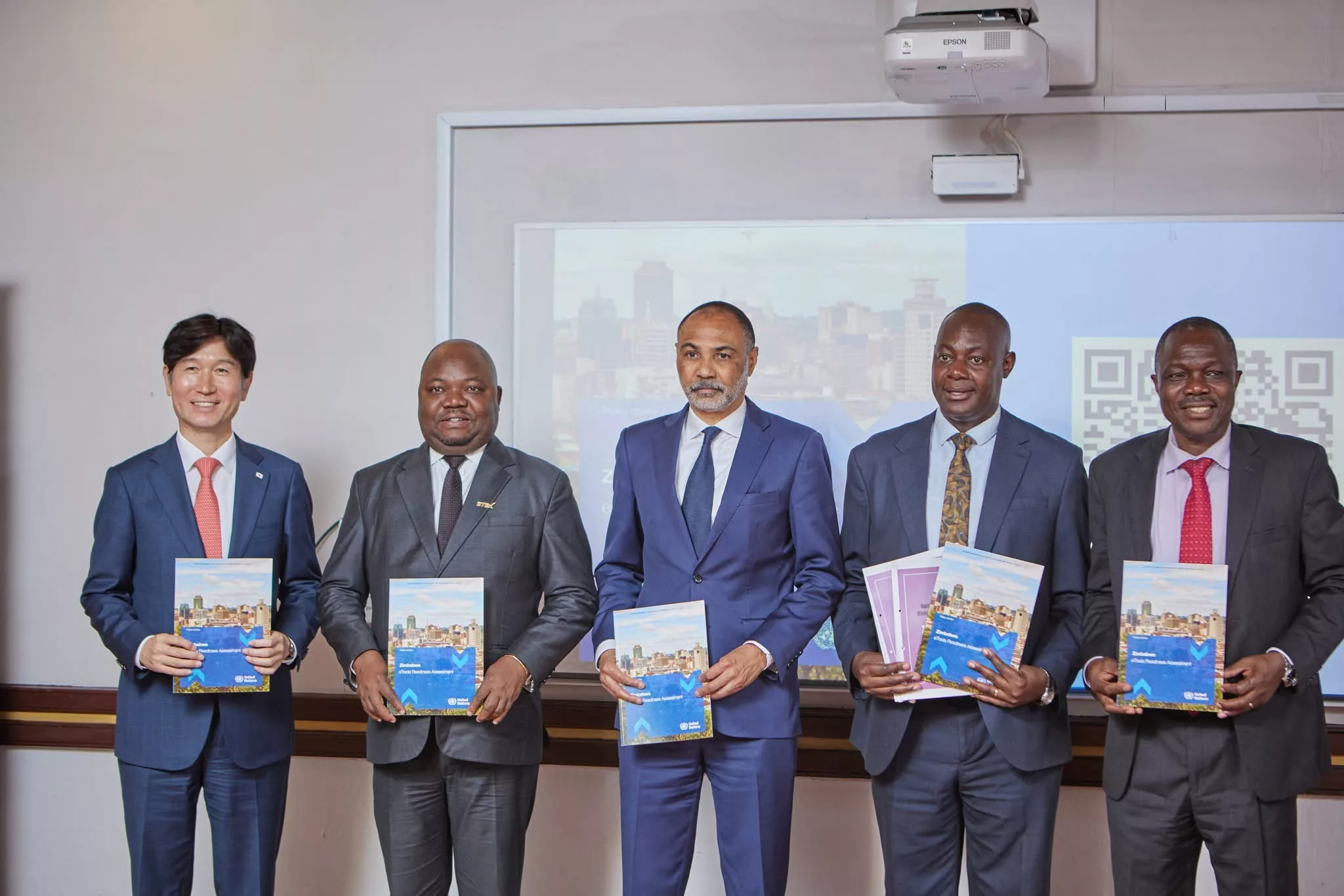|
Getting your Trinity Audio player ready...
|
Writes Sirak Gebrehiwot
28 May 2025, Harare – In a significant milestone for Zimbabwe’s economic trajectory, last week Harare hosted the launch of three key development initiatives: the eTrade Readiness Assessment, the National Productive Capacities Gap Assessment, and the Holistic Productive Capacities Development Programme.
These initiatives, rigorously prepared by the United Nations Conference on Trade and Development (UNCTAD) in support of the Government of Zimbabwe mark a strategic shift towards a digitally inclusive economy, underpinned by sustainable and inclusive growth.
In her video message at the launch, Ms. Rebeca Grynspan, Secretary-General of UNCTAD, highlighted the collaborative efforts underpinning the launch, emphasizing that “today we witness not three separate launches but Zimbabwe’s holistic approach to address challenges with a three-in-one strategy for sustained growth.”
At a critical juncture, Zimbabwe embraces both its agricultural potential and rich mineral wealth while facing significant challenges such as low productive capacities, as measured by the innovative Productive Capacities Index (PCI) and limited e-commerce engagement. Ms. Grynspan said, “Digital readiness without productive capacity leads to dependency.
Productive capacity without digital transformation leads to obsolescence.” This initiative is a testament to Zimbabwe’s commitment to holistic development, reflecting “development pragmatism at its best” by refusing false dichotomies and embracing integration.
As the nation strives towards Vision 2030 to become an upper middle-income society and achieve the SDGs, the path of synergy and coordination promises not only growth but also inclusive and sustainable prosperity, supported by the United Nations’ strong partnership to transform today’s plans into tomorrow’s realities. By committing to development synergy, Zimbabwe proves that the future of trade and production is interconnected and inclusive.
Dr. Ayodele Odusola, UNDP Resident Representative and Acting UN Resident Coordinator in Zimbabwe, emphasized the pivotal nature of these initiatives. “This launch is a testament to our commitment to evidence-based policymaking, capacity building, and multilateral cooperation. It aligns seamlessly with Zimbabwe Vision 2030 and the broader 2030 Agenda for Sustainable Development,” Dr. Odusola noted.
He highlighted how these initiatives embody the spirit of cooperation and national ownership, serving as a blueprint for other nations navigating similar developmental landscapes. Dr. Odusola further called for urgent and comprehensive action in support of Zimbabwe in addressing the key gaps in its productive capacities’ development. Fostering such capacities is the only option available to achieve inclusive growth and sustainable development.
Highlighting the Government of Zimbabwe’s active role, Dr. Odusola said, “The government’s vision and leadership are indispensable in driving these initiatives, and their implementation success hinges on this partnership. The United Nations is proud to support Zimbabwe with policy expertise and technical tools.”
Echoing these sentiments, Honourable M Ndlovu, Minister of Industry and Commerce, heralded the reports as crucial to rejuvenating Zimbabwe’s industrial and commercial sectors. “These reports symbolize a leap towards digital transformation and industrial growth,” he stated, commending the fruits already visible from Zimbabwe’s engagement with global digital platforms since participating in the UNCTAD e-Week in 2023.
Similarly, Honourable Tatenda Annastacia Mavetera, the Minister of ICT, Postal and Courier Services, stressed the significance of the eTrade Readiness Assessment as a strategic tool to realign and turbocharge Zimbabwe’s digital economy. “E-commerce is not optional; it is an imperative,” she underlined. “Our E-Transactions and E-Commerce Bill will foster secure, efficient digital transactions, promoting consumer confidence and innovation.”
The reports are not simply analytical documents, but action-oriented frameworks designed to guide Zimbabwe through identified challenges. These include enhancing digital infrastructure, navigating regulatory landscapes, and building capacity in ICT. Minister Mavetera outlined the importance of fostering digital skills, particularly for SMEs and women-led businesses, ensuring that the digital divide diminishes rather than expands.
Addressing the gathering, His Excellency Mr. Park Jae Kyung, Ambassador of Korea to Zimbabwe, reflected on Korea’s journey from a developing to a developed economy, attributing significant credit to visionary digital policies. “Korea’s partnership with UNCTAD in this initiative underscores our belief in the transformative power of digital trade. Zimbabwe’s eTrade Readiness Assessment offers a roadmap towards similar transformations,” he asserted, pledging continued support through initiatives like establishing an ICT lab at Zimbabwe Open University.
The spearheading of these reports reflects a multi-layered approach to economic rejuvenation, where digital innovations meet traditional industrial strategies. The National Productive Capacities Gap Assessment (NPCGA), with its candid evaluation, addresses systemic inefficiencies, while the Holistic Productive Capacities Development Programme (HPCDP) provides a strategic framework with its five-pillar approach targeting human capital, infrastructure, economic diversification, governance, and environmental sustainability.
Dr. Odusola emphasized that these initiatives are not isolated events but are part of a broader commitment to multilateral cooperation and national ownership.
“Let us reaffirm our shared responsibility to turn evidence into action and ambition into measurable outcomes. This is more than a celebration; it’s a renewed commitment to partnership and inclusive development,” he said.
The launch signifies a step for Zimbabwe as it positions itself as a formidable player in the digital marketplace—a testament to what strategic alignment, robust partnerships, and policymaking can achieve.
With unwavering support from international partners and a clear, data-driven strategy, Zimbabwe stands poised to harness the transformative power of digitalization for economic growth, environmental sustainability, and social well-being, by building its economy-wide, national productive capacities.
Sirak Gebrehiwot is UN Partnerships and Development Finance Advisor at the UN Resident Coordinator’s Office in Zimbabwe






